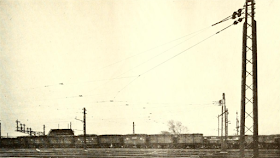| Information | |
|---|---|
| Number built: | 10 |
| Built: | 1914 |
| Builder: | NER Darlington |
| Engine: | 4 Siemens traction motors (1500v DC OHLE) |
| Power: | 1, 100 hp (820 kW) (Class EB1) 1, 256 hp (937 kW) |
| Wheel arrangement: | Bo-Bo |
Unfortunately a decline in coal traffic throughout the 1920s made using electric locomotives on the line uneconomic. The catenary needed replacement by the mid-1930s, the decision was made to revert to steam traction in 1935 [5]. The locomotives were withdrawn though one did survive as a shunter used at the Ilford carriage sidings. For this role it's power output was raised. It survived into British Railway use and became known as the Class EB1. It was finally withdrawn in 1964 when the electrification was converted to AC [7].
 |
| Public domain image [1] |
 |
| View of the catenary in a freight yard, public domain image [6] |
[2] Brian Haresnape, Electric Locomotives (Ian Allan, 1983) p. 7
[3] Electric Railway Journal p. 4
[4] R.L. Vickers, DC Electric Trains and Locomotives in the British Isles (David & Charles, 1986) p. 57
[5] Haresnape p. 9
[6] Electric Railway Journal p. 7
[7] Paul Smith & Shirley Smith, British Rail Departmental Locomotives 1948-1968 (Ian Allan, 2014) p. 26
